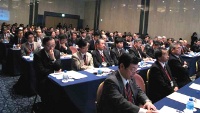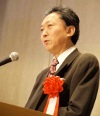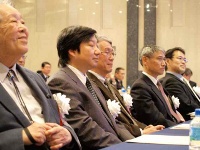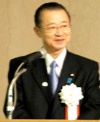 |
 |
|||||||||||||
|
|||||||||||||
|
|||||||||||||
|
On 26 February, in the middle of an important Diet discussion (equivalent to members of congress in Japan) on the supplemental bill, the Advanced Accelerator Association Promoting Science and Technology (AAA) held a symposium entitled “Departing from Japan to Universe – Toward the realisation of International Linear Collider (ILC)” in Akasaka, central region of Tokyo with over 150 participants from industry, academia and the political community. AAA, established in June 2008 with a total of about 100 companies, universities and laboratories, has discussed issues on R&D, intellectual property rights and other related areas concerning the ILC as a model project. The primary aim of this symposium was to review AAA’s activities for fiscal year 2008 and to gain a better understanding of the advanced accelerator – the significance of promoting the R&D and the expected impact to the society. “The Nobel prize given to Professors Nambu, Kobayashi and Maskawa has shown that Japan has become one of the leaders in worldwide particle physics. It was really encouraging for us that the Japanese government expressed the need of setting up a framework with cross-sectional government officials, to discuss basic science project such as the ILC in response to the good news brought from Stockholm,” said Takashi Nishioka, and the Chair of AAA in the opening address. Following to the opening address, two brief speeches were given by Yukio Hatoyama, Acting Chair of the "Federation of Diet members to promote the realisation of ILC", and Secretary General of the Democratic Party of Japan, and Makoto Kobayashi, KEK Honorary Professor Emeritus, and 2008 Nobel laureate in Physics, taking time out from their busy schedules. Hatoyama said: “I am supporting the realisation of the ILC from genuine interest as a human being”. Kobayashi referred to the ILC as "dream machine for particle physicists" and stressed the need to better integrate industry-government-academia efforts, and improve sharing of information. The high-level officials from the Japanese Ministry of Education, Culture, Sports, Science and Technology and the Ministry of Economy, Trade and Industry also attended the symposium and gave short speeches. The symposium started with a lecture by Masatoshi Koshiba, 2002 Nobel laureate in Physics, entitled "Advanced accelerators lead science as a new culture – make the younger generation to feel a thrill of pride", emphasising the importance of continuing basic science activities. Sachio Komamiya then gave a lecture as a brush-up session of the ILC project overview. After Komamiya's talk, Takeo Kawamura, Chief Cabinet Secretary, and co-secretary of the Federation, arrived at the symposium venue in one of those gaps-between-meetings, and gave a lecture entitled "Promoting the ILC project as a national strategy." Kawamura, who had the important role to pass the Basic Law on Space, which was enacted on August last year, said: "Space development is the challenge for space, and the ILC is the challenge for the universe. There are three ways to challenge the universe: going into deep space with launching surveillance satellites, observing space with telescopes, and recreating the Big Bang on Earth – the ILC. The federation will go over the ILC project from different points of view, such as education, industrialisation, foreign diplomacy on science, and will write up the roadmap collaborating with industry and laboratories." After Kawamura's lecture, Atsuto Suzuki, the Director General of KEK gave a presentation on KEK's road map, talking about future plans of Japanese accelerator science. Representing the industry, Osamu Maekawa, Chief Technology Executive of the Toshiba Corporation Power Systems, explained in his lecture detailed technical challenges regarding ILC components from the industry's point of view. The symposium was wrapped up by Masamitsu Naito of the Democratic Party of Japan, and co-secretary general of the Federation, who reported on his visit to accelerator facilities in Japan and abroad. Naito said: "To start discussing the realisation of the ILC, we have issues which need to be addressed before that." He pointed out three issues: maintain competitiveness in R&D, and human resource development through the activities at KEK and J-PARC, cultivate the cosmopolitanism of Japan to make ideal environment for scientists from all over the world, and most importantly, communicate with people in Japan to gain broad public support. “AAA will strengthen its communication activity in next fiscal year,” said Masato Arima, AAA's chief secretary. “We are planning to organise a series of outreach symposiums in local cities in Japan. We would like to send the message to the public that basic science research is wonderful.” The next AAA symposium will be held in June. -- Rika Takahashi |
|||||||||||||
| © International Linear Collider |



